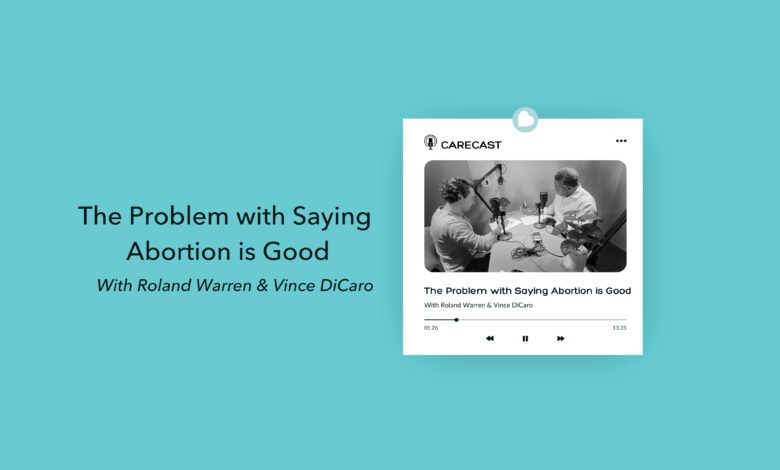The Problem with Saying Abortion is Good

“There are no ill effects from abortion.” This is what one church leader explained to a recent denominational gathering of other church leaders. This leader asserts that abortion is good for women, and society, because it helps them gain economic power—among other things.
In this episode of CareCast, Care Net’s podcast about faith, family, and life with Roland Warren, Care Net President and CEO, and Vincent DiCaro, Care Net’s Chief Outreach Officer, dig deeper into what told the leadership gathering about how the church should deal with abortion in a post-Roe world. Let’s hear what Roland and Vince have for us in the latest CareCast.
Want to hear the podcast? Find full access to the latest episode of CareCast.
Not on SoundCloud? Listen to iTunes o Spotify.
Why Saying “Abortion Is Good” Is a Problem.
If you’re a regular CareCast listener, you may remember a recent series where we discussed The Four Arguments dealing with how to talk to Christians who claim to be pro-choice. In that series, Roland and Vince discuss some of the Bible’s most powerful responses to connecting with others when discussing life’s issues.
With God’s help, we continue to record new podcasts because this is a great way for us to provide you with information that will help you engage with others on life’s issues. We must continue to speak light in a dark culture. And sadly, not only in the dark culture, but today, we have to talk to the church. Recently, at a denominational meeting for the Episcopal Church, leaders discussed where the pro-choice faith community should go. Roe v. Wade is reversed.
One of the leaders in this gathering said:
“Freedom is only a mirage if one does not have bodily autonomy…”
This leader asserted that abortion helps women gain economic power and that, “there are no ill effects from abortion.” One commentator writing about the church’s leadership gathering said the leader sought to designate abortion not as an undesirable last resort or a necessary evil but as an “unadulterated social good.” In other words, a “pure social good.” So, abortion, according to this church leader, is good for women and good for society.
“Freedom is only a mirage if a person does not have bodily autonomy…” Isn’t this exactly what Satan told Eve, Roland pointed out in the latest CareCast. This is the view behind Satan’s temptation to Eve. Satan encourages Eve to say, “Your body, your choice.” Think about it: “Your fruit, your choice.” He encouraged Eve to gain autonomy from God by grabbing the fruit and consuming it—even though God had clearly said, “Don’t.”
Where did Eve end up eating the fruit? Destruction came from that decision. This church leader needs prayer. He is saying exactly what Satan has said to the culture—to women—and that is very dangerous for all of us. Not only is this problematic, but it is also deceptively wrong because any true freedom requires restraints. You cannot have freedom without restraint. Roland and Vince discuss this in depth on the podcast. Did I mention you should listen to it?
But for a quick thought: Imagine we agree to play a baseball game. What if I said, “I’m going to play this baseball game. But I want real freedom while I play. I want full body autonomy—to be able to do whatever I want.” So, throw me the first pitch. I hit it, of course. Then, I tried to catch it myself. Or, while I’m running the bases, I walk off the baseline and run to the stands, get a hotdog, and come back to step on home plate. Wouldn’t it be unreasonable to make up my own rules as I go along?
If there are no obstacles in a baseball game, you might be playing catch—but you can’t play baseball by your own rules. You didn’t create baseball, you just play it. You are not the author of life, so you cannot play by your own rules and decide who lives and who doesn’t—or whose life has more value.
James wrote in his New Testament book, “If anyone thinks he is religious without controlling his tongue, his religion is useless and he is deceiving himself. The pure and undefiled religion before God the Father is this: caring for orphans and widows in their distress and keeping oneself undefiled in the world” (1:26-27).
In the Bible, orphans and widows are the most vulnerable. As Roland and Vince so well point out, now, you can add one more group to this list—the unborn child. But what does James’ early writing have to do with Roland and Vince’s baseball example?
The obstacles we are given in life usually come from God and are given for the protection—in the game—of those who play. The point is, rules and warnings should exist to protect the vulnerable, and in some cases, protect yourself against yourself.
It is often wise when faced with a life-or-death decision to ask, “Who will suffer?” Will the weak suffer? Or will you be?
When a culture decides not to protect the vulnerable life of the unborn, we are saddened—but not surprised.
When a church leader from a prominent denomination decides to refuse to protect the vulnerable, we must see it for what it is—not an “unadulterated social good,” but as useless and deluded religion.
Looking for a full podcast? Find access to the latest episode and more.
Not on SoundCloud? Listen to iTunes o Spotify.






